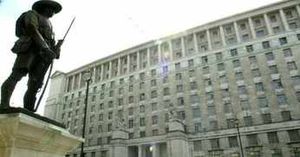600,000 people's MoD data stolen
The Government is under fire for yet another data breach after revealing a laptop containing the details of 600,000 people was stolen in Birmingham.

The Government is under fire for yet another data breach after revealing a Royal Navy officer's laptop containing the details of 600,000 people was stolen in Birmingham.
The Tories immediately called for answers as to how more data had gone missing from Government hands while the Liberal Democrats' dubbed the incident "very embarrassing".
The British Armed Forces Federation (BAFF) said the fact that the laptop appeared to have been left in a car overnight "spoke volumes" and called for a top-level inquiry into the incident.
And one information expert said he was "flabbergasted" at the security lapse and claimed it rivalled the child benefit data loss from HM Revenue and Customs last year.
The laptop was stolen from the officer in Edgbaston on the night of January 9 and reported the following morning, but the theft was only revealed on Friday night by the Ministry of Defence when the news began to leak.
It contained personal information from people who had joined up to the Royal Navy, Royal Marines and Royal Air Force and from people who had expressed an interest in joining. Entries on the computer included passport details, National Insurance numbers, drivers' licence details, family details, doctors' addresses and NHS numbers, the MoD said.
Shadow defence secretary Liam Fox demanded to know how the laptop had gone missing, what protection was in place and why the information was carried in that way in the first place.
Liberal Democrat defence spokesman Nick Harvey said: "For the details of people in such sensitive positions to vanish like this defies belief. It should convince anyone who still has any doubts that we should not allow the Government to put all our details on an ID card."
One of the founders of the BAFF, Douglas Young, said: "It is difficult to imagine how it could be worse - that a range of personal details of actual members of the Armed Forces, but also from those enquiring about joining the Armed Forces have been allowed to go missing, presumably unencrypted."
Simon Davies, director of Privacy International, a human rights group which acts as a watchdog on surveillance and privacy invasions by governments and corporations, said: "I am flabbergasted. I cannot believe that, after everything that has happened, our flagship security agency cannot get the handling of its information exactly right."





